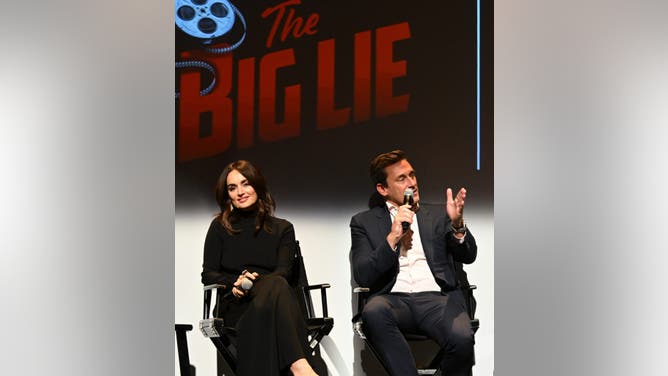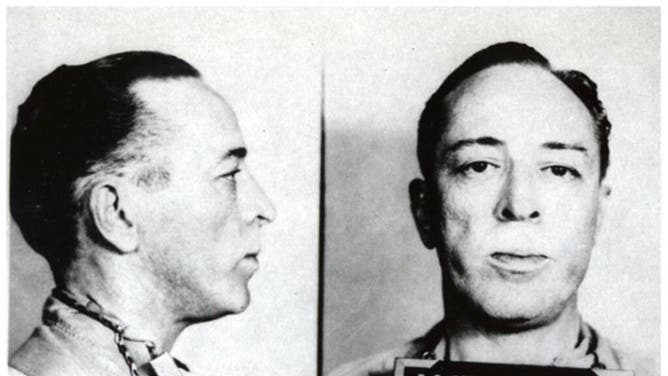Hollywood Loves Reminding Us About '50s Blacklist, Ignores Modern Version
Hollywood’s favorite topic, the 1950s Blacklist, is front-and-center again. This time, it’s courtesy of “Mad Men” alum Jon Hamm.
What’s maddening is how celebrities refuse to learn the lessons from that era. In fact, they often double down on them.
Hamm stars in this summer’s new Audible podcast drama “The Big Lie,” set during the 1950s. The audio series casts Hamm as an FBI agent assigned to crush a movie tied to the Hollywood Blacklist.

Ana de la Reguera and Jon Hamm speak onstage at the world premiere of "The Big Lie" (Photo by Bryan Bedder/Getty Images for Audible)
The Blacklist era, spearheaded by Sen. Joe McCarthy, hunted down anyone with Communist ties, real or alleged. That directly impacted Hollywood, sending celebrated screenwriters like Dalton Trumbo of "Thirty Seconds Over Tokyo" fame scrambling to defend their First Amendment rights.
He was one of the Hollywood 10, screenwriters, directors and producers forced to appear before the House Un-American Activities Committee (HUAC) to describe and defend their political affiliations.
Tinsel Town subsequently blacklisted the group, forcing some to find creative ways to produce art.
Hamm’s seven-part audio series, from John Mankiewicz, a relative of “Citizen Kane” co-screenwriter Herman Mankiewicz, co-stars Kate Mara, Giancarlo Esposito and David Strathairn.
The Blacklist period remains a sorry chapter in American history, and Hollywood can’t stop retelling it. Previous films exploring the era include “Guilty by Suspicion” (1991) with Robert De Niro, “The Front” (1976) with Woody Allen, “Good Night, and Good Luck” (2005) directed by George Clooney and “The Majestic” (2001) with Jim Carrey.
Trumbo personally inspired two feature films -- the 2007 documentary “Trumbo” and 2015’s “Trumbo” starring Oscar nominee Bryan Cranston.

Writer Dalton Trumbo mugshot on June 9, 1950. (Photo courtesy Bureau of Prisons/Getty Images)

Bryan Cranston as Dalton Trumbo in the 2015 film, "Trumbo"
Last year’s Oscar-nominated film “Being the Ricardos” featured a major subplot tied to the Blacklist. And we’ll soon see a feature film based on Sen. McCarthy, with celebrated actor Michael Shannon playing the title character. Production starts later this year.
The ironies couldn’t be more obvious to everyone except those within the Hollywood bubble.
A new Blacklists exists today in Hollywood, one with frightening echoes of the past. Journalists occasionally write about it without any sense of outrage. The industry's stars and starlets either ignore it or silently wish it well.
It targets conservative artists, folks who lean to the Right and/or vote for politicians like Donald Trump.
Sound like a conspiracy?
Ask Gina Carano, who was fired for sharing right-leaning social media messages far less incendiary than her progressive peers. Or Antonio Sabato, Jr., who said publicly supporting President Trump effectively crushed his acting career.
The problem is hardly new.
During the 2016 presidential campaign the Hollywood Reporter queried right-leaning artists for their thoughts on the election.
While THR spoke to dozens of Trump voters, few wished to announce their support, citing their desire to avoid backlash from co-workers. One makeup artist, for example, says longtime clients stopped hiring her after learning she was a Republican.
In 2018, former “Home Improvement” child star Zachery Ty Bryan said Hollywood had more conservative stars than many suspect, but they stay silent for fear of career retribution.
Podcaster and free thinker Adam Carolla may have said it best.
“This is a town that never stops talking about the evils of McCarthyism who will gladly blackball you and remove you from your source of revenue if they could.”
The newest Blacklist 2.0 target?
Stars who suggest vaccine mandates and other pandemic restrictions might not be in our best interest.
Black actor Clifton Duncan revealed how his career collapsed after he refused to get the COVID-19 vaccine as his Hollywood bosses insisted.
"So now I'm staring down the barrel of 40 years of age. I no longer reside in the city formerly known as New York, a place I called home for a decade and a half. I wait tables for a living, something I hadn't had to do since I was 22 years old. I no longer have a powerful manager sending me auditions for lucrative, high-profile, life-changing projects, and I no longer have the prospect of earning a five-figure weekly salary working in TV or on Broadway. And so now the prospect of paying off all those NYU loans, maybe even starting a family, have become even more distant dreams.
Today’s blacklisted stars don’t fear jail time or getting hauled before a draconian government committee. Instead, they stay whisper silent, worried their next gig could be their last.